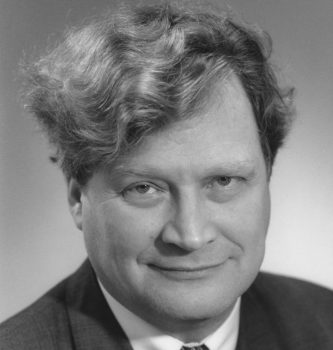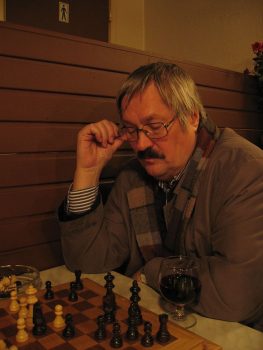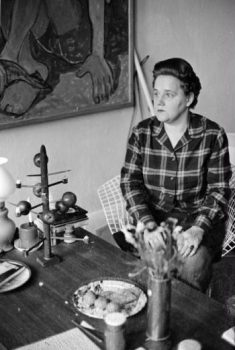Fiction
The Conference
Issue 4/1978 | Archives online, Fiction, Prose
A short story from Alamaisen kyyneleet (‘Tears of an underdog’, Karisto 1970). Introduction by Pekka Tarkka
Dr Smith said that he did not believe that any immediate threat of an invasion from Space was likely to arise for some time. Observations to date had given no support to the view that any such preparations had been put in hand. Technically they were of course ahead of us, but in his opinion there was no cause for panic. Nor could he endorse the widespread but naive assumption that any confrontation with beings from Space must inevitably lead to war. If human beings had reason to feel threatened, it was from each other that the chief threat came. He urged the Conference to work for a situation in which every country would be preparing for peace rather than for war. He said he had no wish to sound sardonic, but that he had noticed that when war was prepared for, it was usually war that ensued. More…
Poems
Issue 4/1978 | Archives online, Fiction, poetry
Poems from Kuolleet vedet (‘Dead waters’). Introduction by Aarne Kinnunen
1
A faraway tucked-away room
Leathery harness odour
An obscure carriage house
A mighty delay
And out through a narrow gate slipped childhood
And a pony cart was coming to get us
swishing on the sand
White gloves on the coachman
and ornamented with a whip, the lash sounding
We were driving through spotted leaves
Lustre, dolour, lustre,
remembrance, snow
And suddenly the driver was gone
and nothing but hands were gripping the horse
and they were leading me I don’t know where. More…
The Onlookers
Issue 3/1978 | Archives online, Fiction, Prose
A short story from Naisten vuonna (‘In women’s year’, 1975). Introduction by Pekka Tarkka
The two elks came out on to the road through a gap between timber sheds. They began to cross the road, and the larger one was very nearly run into by a car. Cars stopped and horns tooted, till the elks turned and made off towards the harbour. Several cars swung round and drove along the cinder track in pursuit of the animals.
The elks headed across the rubble towards the power station; after circling some stacks of railway sleepers, they ended up on the flank of a coalheap sixty feet high. The cars pulled up and their occupants poured out, shouting that the elks wouldn’t go that way, it was a dead end. The elder of the two elks had indeed sensed this, and they moved off to the right, skirting the coal-heap and emerging among the timber-stacks. By this time the first cyclists and pedestrians had arrived on the scene.
“They’ll break their legs,” said a pedestrian to a motorist. “There’s all kinds of junk lying about.” More…
Sensitivity session
Issue 2/1978 | Archives online, Fiction, Prose
An extract from the novel Ja pesäpuu itki (‘And the nesting-tree wept’). Introduction by Pekka Tarkka
Taito Suutarinen knew quite a bit about Freud. Where Mannerheim’s statue now stands, Taito felt that there ought instead to be an equestrian statue of Sigmund Freud. It would be like truth revealed.
Freud, urging on his trusty stallion Libido, would be clad from head to foot in sexual symbols – hat, trousers, shoes: one hand thrust deep into his pocket, the other grasping a walking-stick. The stick would point eloquently in the direction of the railway tracks, where the red trains slid into the arching womb of the station.
Taito had also attended a couple of seven-day sensitivity training courses, where people expressed their feelings openly, directly and spontaneously. By the end of the first course Taito was so direct and spontaneous that he couldn’t get on with anybody. By the end of the second he was so open that everyone was embarrassed. Every member of the group had cried at least once, except the group leader. Never before had Taito witnessed such power. He could not wait to found a group of his own. Taito’s group met in a basement room, where they reclined on mattresses to assist the liberation process. Everyone was free to have problems, quite openly. You were not regarded as ill: on the contrary, if you realized your problem you were more healthy than a person who still thought he mattered. Moreover, as Taito, fixing you with his piercing gaze, was always careful to emphasize, every problem was ultimately a sexual problem. Taito would spontaneously scratch his crotch as he spoke, making it clear that he himself had virtually no problems left. More…
Meetingplace the year
Issue 2/1978 | Archives online, Fiction, poetry
Poems from Kohtaamispaikka vuosi (‘Meetingplace the year’, 1977). Introduction by Mirjam Polkunen
1.
I look in from the gateway
there are children, there in the yard playing.
They look small from here, remote.
From the years
I have walked past this gateway,
there they are: five, six.
The same number.
They have a ball in the air, they yell at it.
Silly that I still here too
remember you,
I could be the same age now.
More…
Poems
Issue 1/1978 | Archives online, Fiction, poetry
Poems from Laulu tummana tulevi (‘The song comes darkly’, 1976). Introduction by Pentti Saaritsa
1
I have longed for you
as the burning heath for rain,
I have asked for you
as fingers of moss for shade,
I have yearned for you
as the dusty mind for tears,
and I have loved you
as distant lightning the dark,
I have been in you
as flowering pine in the wind.
The blue will-o’-the-wisps dance,
strangers stitching happiness.
Silvery the spring mornings,
the trumpets bright in summer,
the autumns cranberry-red,
the white legend of winter. More…
Poems
Issue 4/1977 | Archives online, Fiction, poetry
Poems from Tanssilattia vuorella (’The dancing-floor on the mountain’). Introduction by Pekka Tarkka
I
Having studied
Krinagoras
the flower of Philippos’ wreath
under the vaults in a cool library far away in silence
I have gone to see the boat how it is coming on
whether it will be in working order next summer
we have no strong men
have sat on the beach-hut steps thinking of him
the politician the negotiator:
poetry is a holding of council, an art of negotiation More…
Poems
Issue 3/1977 | Archives online, Fiction, poetry
Poems from I de mörka rummen, i de ljusa (‘In the dark rooms, in the bright ones’, 1976). Introduction by Kai Laitinen
1
He covers his grey floor with glowing carpets.
He has bought them cheap. No one sees they are fakes
except The Great Specialist – but he never comes.
He covers the windows with curtains like waves of silk
and wraps himself up in his food with a blind look of hunger.
Those who follow him – the wife, the children – have to run.
He goes quickly through the dark as though it were hounding him.
He is right: it is hounding him, it catches up with him
when he wakes defenceless in the night. He is abandoned:
all the time there is a noise in the rooms, a burglary,
he is afraid and does not move but in the dark holds
his hand to his eyes, it is cold and strange.
Each day he goes to his life and comes from it.
He is like a wagon. A wagon has its uses.
It trundles heavily past sidestreets and down to the harbour.
He stops: it is light over the sea, a light
hidden by clouds. As though he had seen it once, before.
What he sees is nothing, stretching far away.
There are waves, but they are all standing still. More…
A Wedding Dance
Issue 1/1977 | Archives online, Fiction, Prose
An extract from the novel Kivenpyörittäjän kylä (‘The stoneroller’s village’). Introduction by Hannes Sihvo
Pölönen got up and went over to his accordion, which he had dumped beside the juke-box. He walked with his stocky trunk thrust forward, his hands dangling; the wallet he had crammed into his hip-pocket, constrained to follow the curve of his fat buttock, made an unsightly bulge suggestive of some kind of excrescence. With a vigorous shoulder movement he hoisted the instrument into position. At once the neck of the bottle in his inside pocket came into view, emitting spurts of foam, and it was some time before he noticed it and managed to nudge it back so that it would lean the other way. Scarlet in the face and streaming with sweat, glaring angrily and doing his utmost to avoid looking in the direction of the assembled company, Pölönen drew some air into the bellows and tried out various notes and chords, fingering the keyboard with an airy nonchalance intended to suggest that he was a complete master of his instrument. All eyes were turned upon this podgy, fair-haired man, with the suit that was far too tight across the shoulders and under the armpits, the very small and rather crumpled tie, the tapering trouser legs with shiny bulges at the knees. The warming-up process continued for what seemed an unconscionably long time, and a certain amount of shuffling and coughing began to be audible; old Nestori Pölönen gazed stiffly down at his shoes, and Saara’s movements, as she busied herself behind the coffee-table, became more and more fidgety. More…
Mishaps, perhaps
Issue 3/1976 | Archives online, Fiction, poetry

Jarkko Laine. Photo: Kai Nordberg
Jarkko Laine (born 1947) writes both prose and verse. He is the author of several hilarious and highly imaginative novels and a pioneer of the generation of Finnish underground poets. One of the most productive of younger Finland’s poets, he draws on the language and forms of mass commercial entertainment, comics, and pop music to write about people of today.
He is currently the editorial secretary of the literary periodical Parnasso. The poem below is from his latest collection Viidenpennin Hamlet (‘Fivepenny Hamlet’, Otava 1976)
![]()
1
In Turku again
the taxi’s travelling East Street
whose wooden sides have gone,
the radio’s laryngeal with static, VHF, the driver’s
telling me the tale,
the ice hockey season’s on us already,
even though there’s rain, green in the park,
I’m staring at the lifted houses
stuffed with sleeping persons,
the landmarks are going out one by one, all of them,
you might as well be
in the middle of the sea in a rubber dinghy,
soon I shan’t recognize anything here but
the cathedral, the castle,
my own name in the telephone directory. More…
Tritonus
Issue 3/1976 | Archives online, Fiction, poetry

Pentti Saaritsa playing chess. Photo by Otso Kantokorpi, 2006.
Pentti Saaritsa (born 1941), author of six collections of poetry, is one of Finland’s leading left-wing poets, who writes about a wide range of individual and social themes. An outstanding translator, he has had a major role in making Latin American literature, especially the work of Miguel Angel Asturias and Pablo Neruda, known and admired in Finland. He also translates from Russian. The first five poems below have been taken from his latest collection Tritonus (‘Tritone’, Kirjayhtymä 1976), and the last two from his Syksyn runot (‘Autumn poems’, Kirjayhtymä 1973). His poems have appeared in various anthologies abroad and are now being translated into Swedish, English and French. Pentti Saaritsa is a member of the editiorial board of Books from Finland.
![]()
1
From the bowels of each apartment house
always that one unknown sound is borne.
Sometimes like drily dripping water, sometimes
as a stone might bite a lump out of itself,
Or a child awake in the dark might learn the word hair.
And a tenant listens, makes a note of it
perhaps to punctuate the interrupted writing of his consciousness
when it makes him restless:
What now, again so soon, is it coming from me
or from the dead building.
An alarm-bell. Did anyone else hear? More…
Front-Line Tourists
Issue 3/1976 | Archives online, Fiction, Prose
An extract from the novel Nahkapeitturien linjalla (‘On the tanners’ line’, 1976)
Paavo Rintala (born 1930) published his first novel in 1954 and since then has brought out a new book almost every year. A merciless critic of the myths surrounding certain national figures and events, he has written about Marshal Mannerheim, against attempts to glorify war, and the ‘inevitability’ of Finland’s involvment in the German Barbarossa plan. He has made considerable use of reportage technique to produce anti-war documentaries and in more recent years worked with international subjects.
His books have been widely translated and are popular in East and West Europe. Paavo Rintala’s novel Sissiluutnantti (‘Commando Lieuenant’, Otava 1963) and its reception were the subject of a book by the ltterary critic Pekka Tarkka (Paavo Rintalan saarna ja seurakunta. ‘Paavo Rintala’s sermon and congregation’, Otava 1966). Paavo Rintala is chairman of the Finnish Peace Committee. The passage below is taken from Nahkapeitturien linjalla (‘On the tanners’ line’, Otava 1976) in which he again turns his attention to the war years. Rintala looks at the events of the years leading up to the war and the course of the war itself through the eyes of many different people – from the leading politicians of the day to the ordinary soldier.
The novel has already been acclaimed as the monument to the ‘unknown soldier’ of the Winter War.
![]()
Hessu duly presented himself at the Viipuri office of the Army Information Department (Visitors’ Escort Section), where it was implied that the expected visitors were Very Important People and that a singular privilege was being conferred upon Hessu and such front-line troops that the party might visit. Although His Excellency Field-Marshal Mannerheim made it a rule never to allow front-line visits by ordinary journalists or even by special correspondents, these gentlemen were, it seemed, such influential people that H.E. had agreed to their visit without demur. “You understand, Padre, what a great responsibility this will be for you? These are very high-up people.” More…
In the early hours
Issue 1/1976 | Archives online, Fiction, Prose
An extract from Dyre Prins (‘Sweet Prince’, 1975). Introduction by Ingmar Svedberg
Donald Blaadh, a retired businessman, has been called to visit an influential acquaintance in the middle of the night.
He was sitting in the library, listening to Shostakovich, the Leningrad Symphony. The slow crescendo. The insistent march rhythm. Dogged endurance. Indomitability. He switched it off when I came in.
“I can’t sleep,” he said.
“Neither can I.”
He ignored the ironic undertone. “Shostakovich sharpens the decisionmaking faculties, the way chess sharpens the wits,” he said. “A sort of exercise routine … but I forgot, you don’t play chess.”
“No, but I do play the gramophone.”
“To-day I’m going to start you off with a quiz: whose immortal words were these, ‘Minerva’s owl never takes to the air till twilight is falling’?”
“I don’t know.” More…

